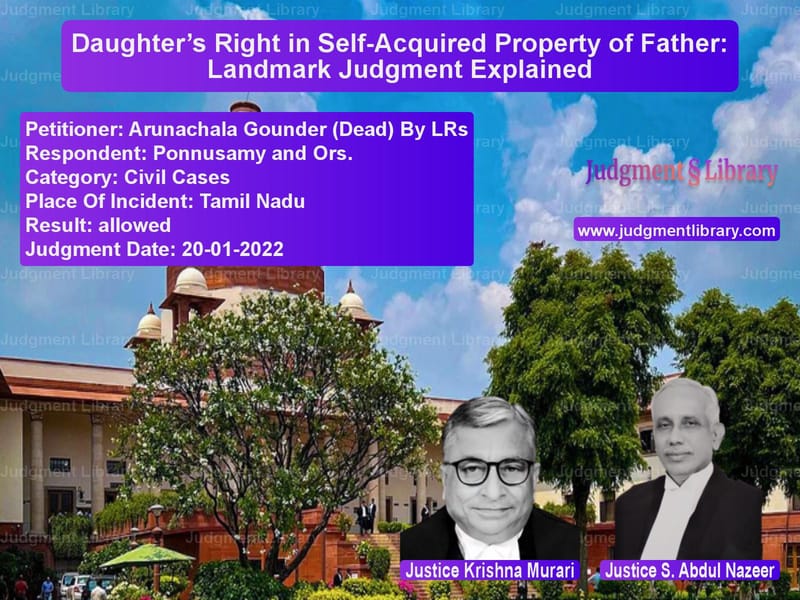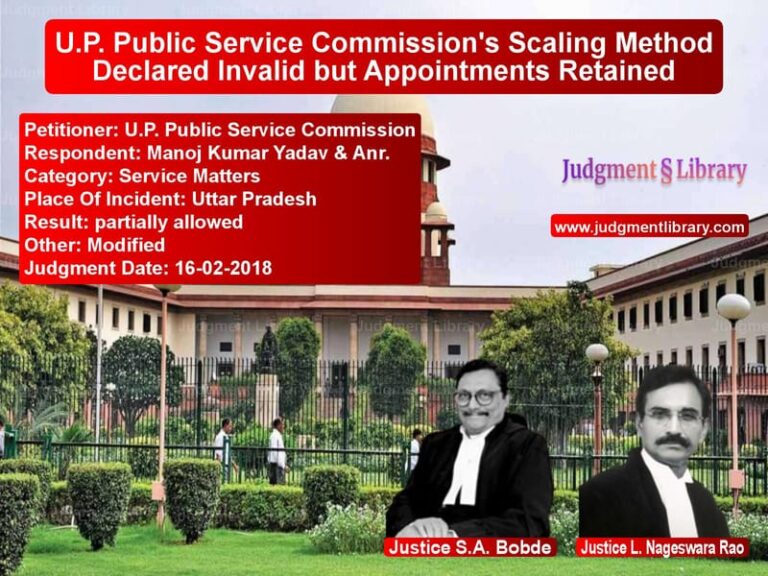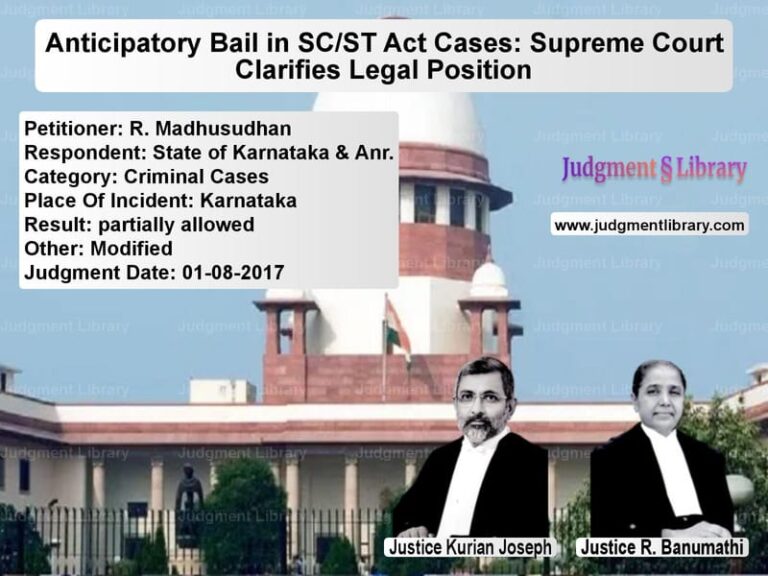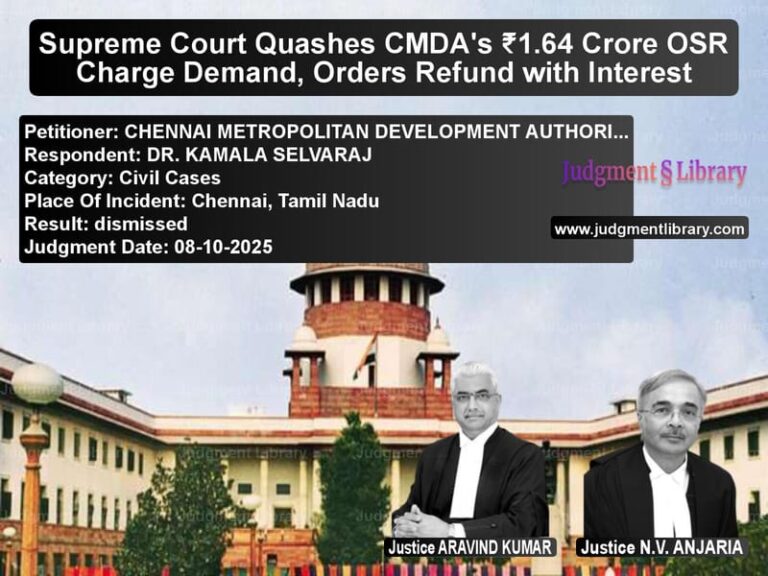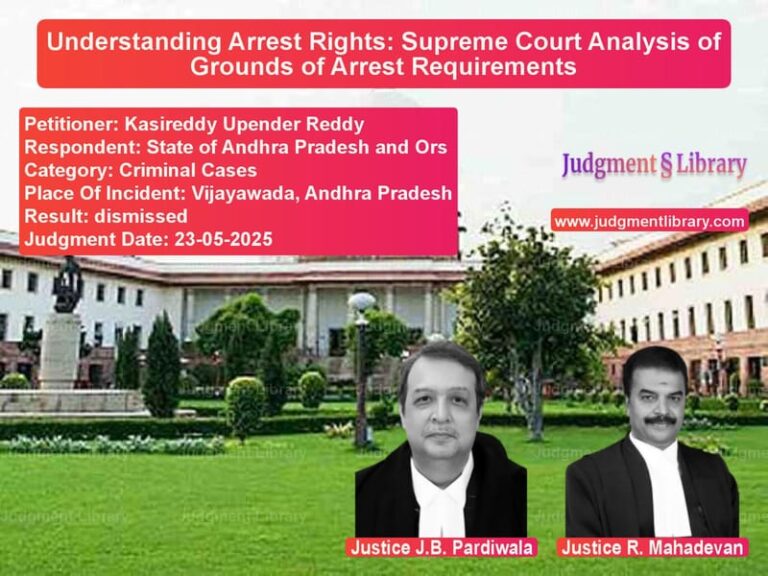Daughter’s Right in Self-Acquired Property of Father: Landmark Judgment Explained
The judgment in the case of Arunachala Gounder (Dead) By Lrs. v. Ponnusamy and Ors. brings clarity to the question of whether a daughter can inherit her father’s self-acquired property when he dies intestate before the commencement of the Hindu Succession Act, 1956. The Supreme Court has emphatically ruled that a daughter has a right to inherit her father’s separate or self-acquired property in preference to other collaterals.
Background of the Case
The dispute revolved around the succession of the self-acquired property of Marappa Gounder, who passed away in 1949. The appellant, representing the legal heirs of the deceased, claimed a 1/5th share in the suit property, contending that after the death of Marappa Gounder, his daughter, Kupayee Ammal, inherited the property and upon her demise in 1967, her legal heirs became entitled to inherit.
On the other hand, the respondents argued that since Marappa Gounder had no male heir, the property should devolve by survivorship to his brother’s descendants, thereby excluding the daughter from inheritance.
Key Issues Considered
- Whether the property was the separate or self-acquired property of Marappa Gounder.
- Whether the daughter could inherit the self-acquired property of her father under pre-1956 Hindu law.
- What would be the order of succession after the death of the daughter?
Court’s Rationale and Key Findings
1. Self-Acquired Property Devolves by Inheritance, Not Survivorship
The Supreme Court ruled that if a Hindu male dies intestate, leaving behind self-acquired property, the same will devolve through inheritance and not by survivorship. This is a significant ruling because it separates self-acquired property from joint family property, which is subject to the principles of survivorship under Mitakshara law.
2. Daughter’s Right Over Collaterals
The Court relied on authoritative commentaries, ancient Hindu texts, and judicial precedents to establish that in the case of a Hindu male dying intestate, leaving behind self-acquired property, the daughter is entitled to inherit in preference to other male collaterals such as a brother or nephew.
3. Hindu Succession Act, 1956 Applies After Daughter’s Death
Since the daughter, Kupayee Ammal, died in 1967, the Court held that the succession would be governed by the Hindu Succession Act, 1956. As per Section 15 of the Act, the property inherited by a female Hindu from her father devolves upon the heirs of her father in the absence of her own issue. This meant that the plaintiff, along with other legal heirs of her father, was entitled to a share in the property.
Most Important Arguments Considered
Arguments by the Appellant
The appellant contended:
- Since the property was purchased through a court auction in 1938, it was the self-acquired property of Marappa Gounder.
- Under Mitakshara law, inheritance is based on propinquity (closeness of relation), and the daughter has a superior right over collaterals.
- The Hindu Succession Act, 1956, grants absolute rights to female heirs, and since the daughter died in 1967, her legal heirs should inherit the property.
Arguments by the Respondents
The respondents countered:
- Marappa Gounder died before 1956; therefore, his property should devolve through survivorship under pre-1956 Hindu law.
- The property was part of the joint family estate and was not the separate property of Marappa Gounder.
- The daughter had no right to inherit as she was not a class-I heir before the Hindu Succession Act, 1956.
Supreme Court’s Verdict
The Supreme Court ruled in favor of the appellant, declaring that:
- The suit property was the separate and self-acquired property of Marappa Gounder.
- Upon his death, the property devolved on his sole surviving daughter, Kupayee Ammal, by inheritance.
- After the daughter’s death in 1967, succession was governed by the Hindu Succession Act, 1956, under which her father’s heirs (including the plaintiff) were entitled to inherit the property.
Accordingly, the judgment and decree of the Trial Court and the High Court were set aside, and the Supreme Court ruled in favor of the appellants.
Conclusion
The ruling reinforces the rights of daughters in Hindu law and establishes that a daughter has a rightful claim to her father’s self-acquired property, even under pre-1956 law. Furthermore, it clarifies that when a daughter inherits her father’s property and subsequently dies intestate, succession will be governed by Section 15(2) of the Hindu Succession Act, 1956, ensuring that the property reverts to the father’s heirs rather than collaterals from the husband’s side.
Petitioner Name: Arunachala Gounder (Dead) By LRs.Respondent Name: Ponnusamy and Ors..Judgment By: Justice Krishna Murari, Justice S. Abdul Nazeer.Place Of Incident: Tamil Nadu.Judgment Date: 20-01-2022.
Don’t miss out on the full details! Download the complete judgment in PDF format below and gain valuable insights instantly!
Download Judgment: arunachala-gounder-(-vs-ponnusamy-and-ors.-supreme-court-of-india-judgment-dated-20-01-2022.pdf
Directly Download Judgment: Directly download this Judgment
See all petitions in Property Disputes
See all petitions in Succession and Wills
See all petitions in Judgment by Krishna Murari
See all petitions in Judgment by S. Abdul Nazeer
See all petitions in allowed
See all petitions in supreme court of India judgments January 2022
See all petitions in 2022 judgments
See all posts in Civil Cases Category
See all allowed petitions in Civil Cases Category
See all Dismissed petitions in Civil Cases Category
See all partially allowed petitions in Civil Cases Category

